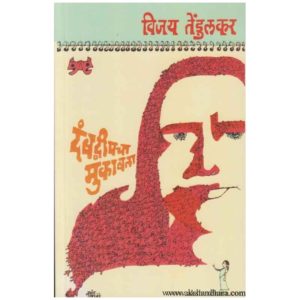 Encounter in Umbugland is translated by Priya Adarkar from the Marathi original Dambadwipcha Mukabala (1974, although some publications say it’s a 1968 publication).
Encounter in Umbugland is translated by Priya Adarkar from the Marathi original Dambadwipcha Mukabala (1974, although some publications say it’s a 1968 publication).
I read this play in its English translation and now am keen to read the original in Marathi (awaiting access to a copy). It is a playful take on politics, power, hypocrisy, manipulation and marginalization. It is the story of the rise to power, of a childish, innocent princess amidst a senior cabinet of ministers and their games after the death of the king.
Umbugland (Dambadwip) is not very different from Andhernagari in Tendulkar’s children’s play Chambhar Chaukashiche Natak. The king assumes ultimate authority and gives orders which are followed by the ministers and the citizens mutely, unquestioned. The simplicity of treatment in Chambhar Chaukashi… makes way for a layered plot of the each minister’s secret wish to rise in power and thus their inability to nominate one of them to the throne, hence appointing a ‘puppet’ in differences the childish, innocent but headstrong Princess Vijaya upon the King’s death. The princess’ chambermaid the eunuch Prannarayan also her wise counsel, is a voice of reason in this mad power game between the ministers and the princess (now a Queen).
…For I am of the – er – third sex. A bat hanging on the tree of life. I only saw the world upside down. And the amusing part is, that from upside down the people of this world seem the wrong way up, but I see the truth straight! I see you upside down, a formless, characterless, lifeless, existenceless gathering… who allow men to become politicians, politicians to become statesmen, statesmen to become cunning, and cunning men to become robots, mechanical men. You are the force that claps its hands, makes strange noises with its mouth, an amazing, untiring force –
That’s his words at the end of the play. At the start too, Prannarayan’s poignant words set the tone elaborating on the three kinds of truth; conventional, diplomatic and real truth to the audience.
What is remarkable is the ‘kadamba tribe’ which preoccupies most of the queen’s agenda in the play is conspicuous by its absence, except for one of the cabinet ministers who is shown silent most of the time and smiling, who only reveals that he is a kadamba when the cabinet is asking his support to oppose the queen’s ‘kadamba plan’ – what better way to ‘show’ the marginalized community that comes to prominence only for political agendas and gains.
Researchers point to the fact that this play depicts Indira Gandhi’s rise to power amidst Senior Congressmen post Lal Bahadur Shastri’s death. Ancient India in Sanskrit was referred to as Jambudwip (island with Indian Blackberry trees) Dumbadwip. Umbugland (its English translation to spins from humbug).
There is a lot to learn in playwriting from this one play. There are multiple themes touched upon in the play that can start discussions around important topics that are relevant even in 2022.
